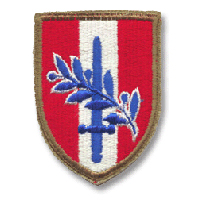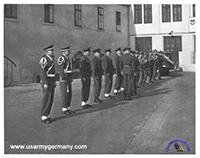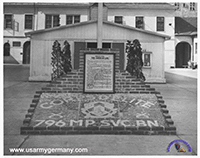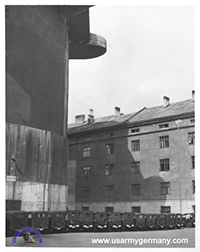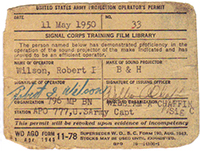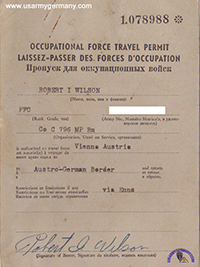If you do NOT see the Table of Contents frame to the left of this page, then
Click here to open 'USArmyGermany' frameset |
796th Military Police Battalion
Vienna Command
Looking for more information from military/civilian personnel assigned to or associated with the U.S. Forces, Austria from 1945 to 1955. If you have any stories or thoughts on the subject, please contact me . . |
|
|
|
|
|
| |
| 796th MP Battalion
History |
| |
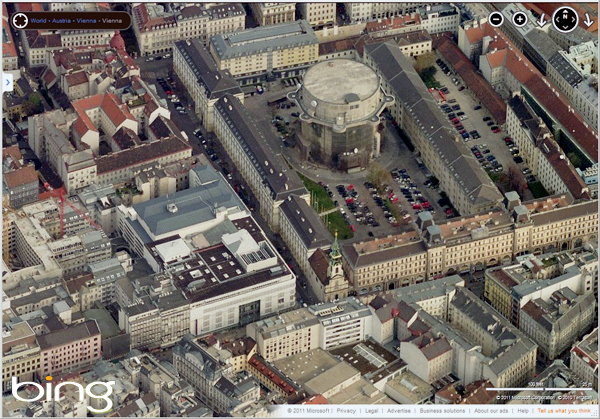
Stiftskaserne, former 796th MP Bn barracks in Vienna (Bing Maps) |
|
| |
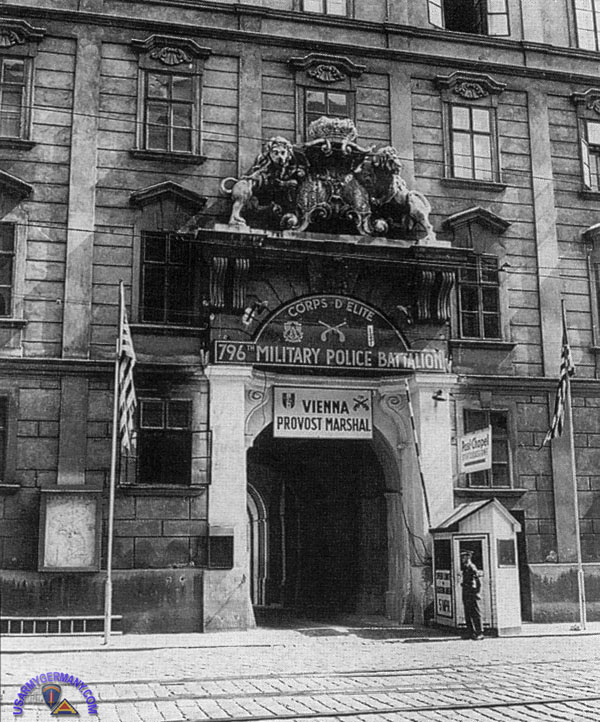
Entrance to Stiftskaserne (Home of the 796th MP Bn) |
|
| |
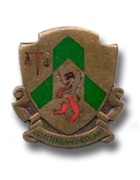 796th Military Police Bn DI 796th Military Police Bn DI |
| |
| 1947-48 |
| (Source: "796th Military Police Bn, 1947-1948 Yearbook", courtesy Mike Keefe) |
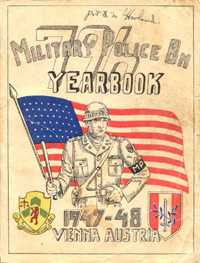 |
|
Page 83
Page 84
Page 85
Page 86 |
|
|
|
| |
| (Source: Email from Bill Meck who served with the 796th MP Bn in Vienna) |
C Company, 505th Military Police Battalion, was attached (to the 42nd Inf Div?) and provided traffic control (for the division) during its drive from Germany to Austria. The unit arrived in Austria with the 42nd Inf Div and then became the original MP's in Vienna (when elements of the 42nd Inf Div moved to Vienna as occupation troops). Cpl Virgil Becker formed the Radio Patrol for traffic control.
In 1945 they originated the four power patrol. Early photos show them using a Jeep. A & B Co, 505th MP Bn, provided stockades and other police duties in Germany, A Co provided the MP for the Nuremburg Trials.
The 524th Military Police Battalion came by convoy from Straubing (after serving on occupation duty with XII Corps in Bavaria). The convoy commander was Lt William Sledge. They operated the PM Office (in Vienna) under then Col William Yarbrough, now a retired Lt General living in Southern Pines, SC. They provided the motorcycle patrol along with the 505th.
The 796th Military Police Battalion (see unit history) was deactivated in France in 1945. The Bn colors were then taken to Vienna on 14 April 1946. The entire Bn consisted of 1st Lt Frederick Ovanich, a Corps of Engineer Officer, and T/4 Gerard J Casey, an Air Force enlisted man. The Bn reported to Vienna Area Command.
On 24 April 1946 the Bn absorbed all of the remaining men from the 505th and 524th MP Bns. Together they formed the HQ Co, A Co, B Co, C Co and D Co. Those of the 505th not transferred to the 796th left for Salzburg as the 505th MP Bn, which later was redesignated as the 572 MP (Company). I am not sure that the 572 is correct it will need a bit of research.
In December 1946 the Bn strength as reported was 22 Officers and 484 EM, as reported by Col Noel Menard, Bn C.O.
I am sure you are aware that in 1953 the 796th MP Battalion was deactivated and the "lettered" companies were redesignated as follows:
 Hq Co became 7690 Hq. Co (Vienna Command) Hq Co became 7690 Hq. Co (Vienna Command)
 A Co became the 61st MP Company A Co became the 61st MP Company
 B Co became 64th MP Company and B Co became 64th MP Company and
 C Co became the 65th MP Company C Co became the 65th MP Company |
|
|
| |
| 1955 |
| (Source: USFA Sentinel, 25 March 1955) |
61st, 65th MPs To Be Replaced By 'Honor Unit'
Two MP companies stationed here were inactivated today, USFA Hq announced. Personnel of the 61st and 65th MP Companies transferred to the 64th MP Company, where the men will be carried as overstrength. Also to be inactivated is the 18th MP Detachment.
The 64th will carry the new members until normal attrition reduces the unit to its proper size. An honor unit from the Salzburg area will replace the two MP companies. The honor unit will be rotated periodically and replaced by another honor unit.
Inactivation of the two units does not change the MP function in the International Patrol, officials pointed out. The 64th MP Company has provided the men for this patrol and will continue to do so. |
|
 |
|
| |
| Battalion Headquarters |
| |
| (Source: "796th Military Police Bn, 1947-1948 Yearbook", courtesy Mike Keefe) |
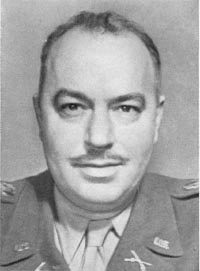
Lt Co Sherman L. Watts
Commanding Officer
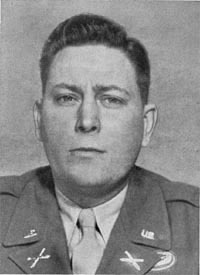 Maj Jerry M. Wimberley
Maj Jerry M. Wimberley
Executive Officer
|
|
S-1 Section
S-1 is responsible for the supervision of the battalion's administrative functions. The Adjutant is responsible for the proper execution of all orders by the Bn. Commander, or his Executive. The Sergeant Major coordinates the various duties within the battalion and checks to see that all correspondence is correctly written and placed in the proper channels. The office's Administrative Clerk writes all correspondence on a battalion level. The Message Center Clerk acts as a courier between higher command echelons, other units, and the battalion. He also keeps a daily log of all correspondence entering and leaving Battalion Headquarters.
S-3 Section
The S-3 Section controls the operations of the Bn. All plans are studied here, men are assigned to a service school for study, and training classes are supervised to raise the efficiency of personnel on Military Police duty. Before an operational mission is undertaken by the battalion, it is scrutinized here, and corrections in the original plan are made.
S-4 Section
S-4, Battalion Supply Section, supervises the breakdown of all articles requisitioned for use by the battalion. At least 50,000 different items are requisitioned by this office, such as operational equipment, office equipment, rations, fuel, weapons, vehicles, ammunition, and articles of clothing.
Headquarters Company
Hq. Co. is responsible for the personnel working in Battalion Headquarters, the various Staff Sections, and the Vice Squad. The Medical Detachment is assigned as part of Hq. Co. Usually, the men in Hq. Co. enjoy more regular working-hours than the men of the other companies. A large percentage of personnel from Hq. Co. are D/S to various sections, performing specialized duties. |
|
|
| |
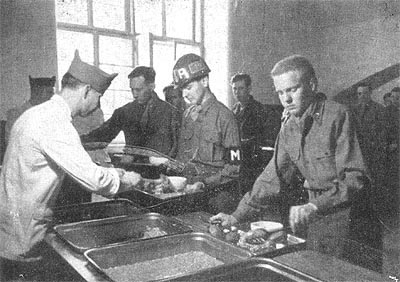 Pfc Ralph F. Breen, cook, is shown dishing out chow
Pfc Ralph F. Breen, cook, is shown dishing out chow
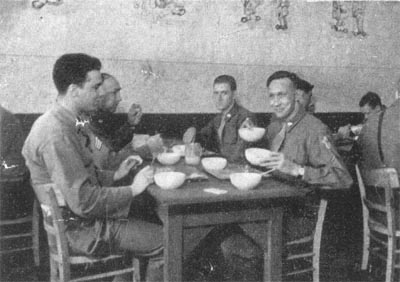 Bn personnel during chow-time in Bn Mess Hall
Bn personnel during chow-time in Bn Mess Hall
|
|
Personnel
The Personnel Officer, WOJG Royce E. Logston is responsible for for the proper handling of all records and correspondence pertaining to the organization's personnel. M/Sgt Henry D. Rodgers, the Personnel Sergeant Major, is in direct charge of the 10 personnel clerks, 2 from each Co. The Personnel Clerks make out the monthly Company payrolls, individual allotments, enter data in service records, type board proceedings, and take care of the many details involved with keeping an individual's records up-to-date.
Special Investigation Section
The Special Investigation Section is a small, but highly efficient law-enforcement agency. The 21 men in the group have the difficult task of impartially investigating all delinquencies involving government property, or American personnel and their personal property. All cases such as attempted rape, larceny, embezzlement, sex offenses, illegal entries, illegal use of weapons, and assaults are investigated by a Field Agent, whose job is not to acquit or convict, but to accurately and objectively report all relevant to the incident.
Work as an Investigator is a "round-the-clock" job, and the personnel in this section are picked, because of specific qualifications. The majority of the men in the section at present have had prior police or investigative experience, and all of them are in top physical condition.
|
|
|
Between the period from 1 January, 1947 to 31 December, 1947, the section investigated 431 criminal cases in the Vienna area. From 1 January, 1948 to 1 May, 1948, 238 cases were handled by the section.
SIS personnel who are unmarried mess and billet separately in a private house in the Eighteenth Bezirk. There are numerous persons in Vienna who can thank the SIS for quick recovery of stolen personal belongings, and without a doubt, the apprehension of many a criminal has been due to the unceasing vigilance of these investigators. |
| |
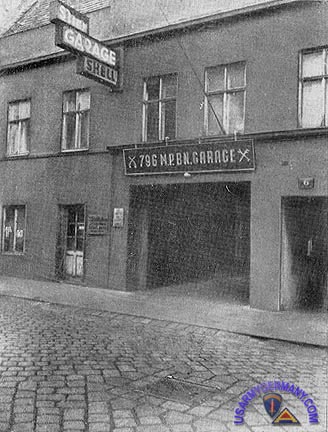 Bn motor pool
Bn motor pool
|
|
Motor Pool
The Motor Pool Section of the battalion is without a doubt one of the most important sections in the unit. Personnel of this section are responsible for the maintenance and efficient use of all vehicles assigned to the organization. The personnel in this section consist of Captain Edwin F. Gracie, Motor Officer; T/Sgt John Domokas, Motor Sergeant; S/Sgt Lee G. Kuntz, Asst. Motor Sgt.; T/Sgt Jessie B. Sherrod, Truck Master; Motorcycle Maintenance Sgt, S/Sgt Nickolas J. DeMicke; Maintenance Inspectors T/4 Carl R. Bost and T/4 Edward Zellny; an Administrative Clerk, T/5 Orval R. Layton; a Records Clerk, Cpl Jan O. Giltjes; a Parts Clerk and his assistant, T/5 Chester Kerstetter and T/5 Gerald J. Durant; a Gas Clerk, Sgt Bill Cohea; eight Mechanics, T/3 Clarence H. Turner, Cpl James R. Harrison, T/5 Harold E. Merchant, Pfc Robert W. Hansen, Pfc Walter L. Crutchfield, Pfc Gene L. Fletscher, Pfc Karr, and Pfc Geiser; and three Dispatchers, Pfc Donald Brown, Pfc Blair J. Carlson, and Pfc Joseph H. Wilson.
|
|
|
There are 139 vehicles assigned to the battalion on the T/O&E. There are 65 jeeps, 16 weapon carriers, 19 command & reconnaissance vehicles, 1 ambulance, 8 2½-ton trucks, and 30 Harley-Davidson motorcycles. All of the above vehicles are assigned to Capt Gracie as Motor Officer. All of the Enlisted personnel are assigned to Headquarters Company, and work an average of 50 hours per week per man.
Each company furnishes a certain number of drivers who perform the 1st Echelon maintenance on their vehicles before, during, and after operation. The drivers also accompany the vehicle during 2nd Echelon maintenance which is done by the mechanics with the assistance of one of the 17 Austrian civilian mechanics working in the Motor Pool.
Special Service Office
"Special Service" is a term which has a broad meaning in the battalion, for numerous problems are solved by the office, which is run by Capt Hugh Basse, Bn. Special Service Officer, and T/5 Bernie Fineman, Bn. Special Service NCO. The original function of the section was to requisition and distribute athletic and recreational equipment to personnel of this unit. Skis, parkas, ski boots, basketball and baseball uniforms, boxing equipment, radios, writing tablets, ping-pong sets, fishing tackle, phonographs, games, day-room furniture, and various other items have been obtained for the battalion.
Hotel and train reservations are obtained for battalion personnel upon request. Tickets for operas, movies, and important athletic events have also been placed at the disposal of personnel.
One important function of the section has been to promote publicity for the battalion, and attempt to keep its activities in the spotlight. Hardly a week passes without a picture or a story about the unit, or its personnel, appearing in some publication.
The section has also supervised activities by an Austrian university students group, which has received financial and material aid from the battalion. The 796th AYA students group occupies two rooms in the rear of the Cafe Batzenhausl, at 10 Karl-Lueger Ring, across from the University of Vienna. The AYA rooms are used by the students as a place to relax and forget their studies for a few moments. The food and other items the battalion has donated to the group serve as a supplement to the meager diet of the students, and has helped many of them to continue their studies, appreciative of the American desire to help the Austrian people to help themselves.
Library
Pfc Eugene J. Burnol, Battalion Librarian, is shown glancing through one of the latest novels received in the Library. The Bn. Library contains over 1500 books, of which 350 are in circulation most of the time. A total of 117 of the latest stateside magazines are received by the Library each month.
I & E Centre
1st Lt Ira D. Morrell, Bn. I & E Officer, is shown pointing to an important place on the Current Affairs Map in the I & E Centre. At the right is S/Sgt William D. Dawson of Hq Co.
The I & E Centre offers USAFI self-teaching and correspondence courses to men interested in furthering their education. Weekly I & E lectures are presented by T/Sgt John H. Galiger, Bn. I & E NCO, and informative literature is distributed to the men. In addition there are 20 "on-duty" courses which personnel can study to improve their efficiency. |
|
|
|
|
|
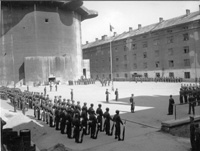
1. Military ceremony at Stiftskaserne
|
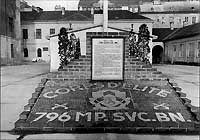
2. 796th moto and insignia in stone
|
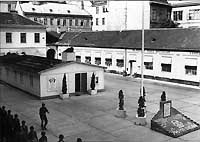
3. Inside Stiftskaserne
|
|
|
 |
|
| |
| "A" Company, 796th MP Bn |
| |
| (Source: "796th Military Police Bn, 1947-1948 Yearbook") |
| The Company's strength consists of 110 Enlisted Men, who are responsible for the 1st Bezirk Station, the 19th Bezirk Station, and the Linz Road Block. The men of Co. "A" also guard the Manner Food Dump; Hq. Command, USFA; the Provost Marshal's Office; the WAC Detachment; and the gates of the Stiftskaserne. |
 |
|
| |
| "B" Company, 796th MP Bn |
| |
| (Source: "796th Military Police Bn, 1947-1948 Yearbook", courtesy Mike Keefe) |
| Company "B" is responsible for the 17th and 18th Bezirk Station, Motorcycle and Traffic Patrols, guarding the Tobacco Building, the Arsenal Warehouse, the Class 2 & 4 Warehouse, the Franz-Joseph Bahnhof, and the Stiftskaserne. Men of Co. "B" also serve as Foot Patrols in the 1st Bezirk every 4th month. |
 |
|
| |
| "C" Company, 796th MP Bn |
| |
| (Source: "796th Military Police Bn, 1947-1948 Yearbook", courtesy Mike Keefe) |
| Company "C" is responsible solely for the efficient operation of the International Patrols and Radio Patrols. Because of its "round-the-clock" duties, the Company strength is much greater than those of the other companies. There are 130 men in the company. |
|
|
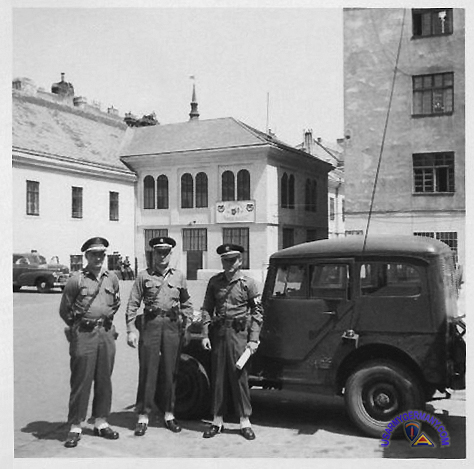
MPs at an unidentified location in Vienna (Mark Wilson) |
|
| |
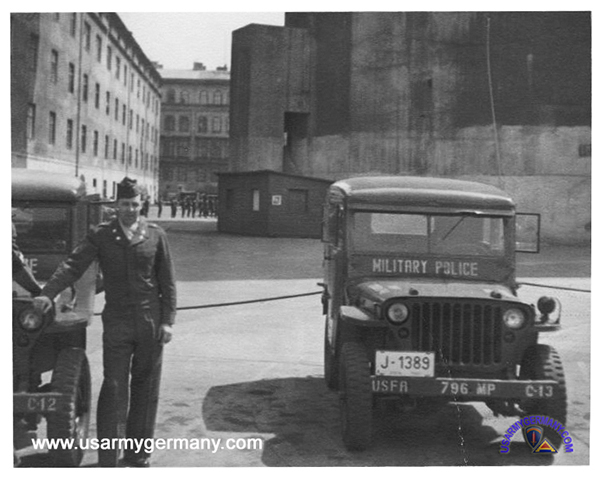
C Company motor pool, Stiftskaserne (Mark Wilson) |
|
| |
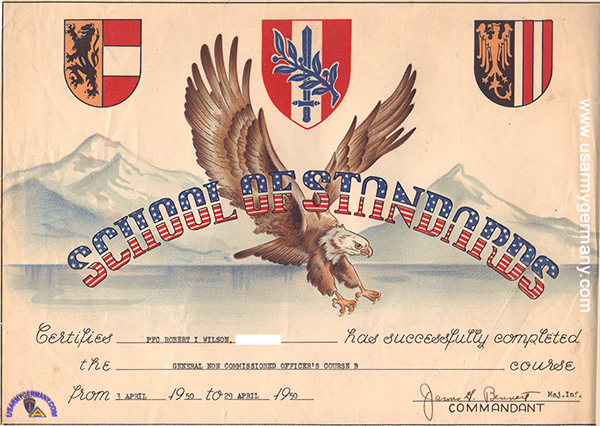
Certificate received after completing a course at the School of Standards, Zell-am-See, Austria |
|
| |
| 1950 |
| (Source: Email from Mark Wilson, son of Robert I. Wilson) |
Some background on my father - Robert I Wilson 1/6/22, born in VT and grew up in Greenwich CT. Enlisted in the Army 12/16/41, did basic in AAF, mechanic background, transfered to MP, 112th Reg. 28th ID. Stayed with the 28th through the war. Discharged 9/45.
Was with the National Guard and then became active 1/50. Was with the 796th 1950-1951, transferred to the 209th MP Kobe, Japan 1952-1953, then discharged.
He passed away 4/1997. |
|
 |
|
| |
| "D" Company, 796th MP Bn |
| |
| (Source: "796th Military Police Bn, 1947-1948 Yearbook", courtesy Mike Keefe) |
| Company "D" is responsible for the 7th & 8th Bezirk Station, the 9th Bezirk Station, guarding the American Legation, the Astoria Garage, Hernales Motor Pool, the Vienna Sales Commissary, the Vienna PX, and placing Foot Patrols in the 1st Bezirk every 4th month. The Company strength consists of 116 men. |
 |
|
| |
| International Patrol |
| |
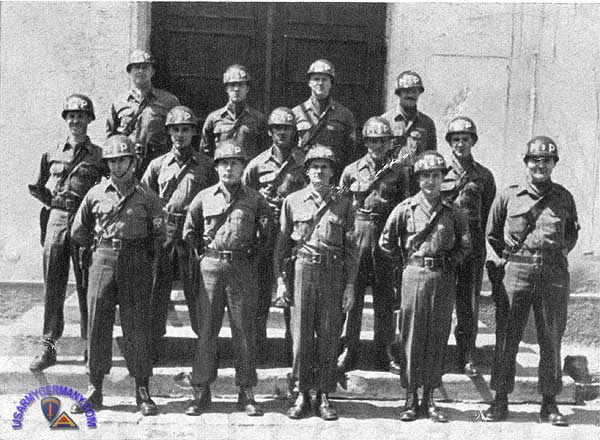
Members of the International Patrol
| Front Row, l - r |
T/5 Rifus w. Hayes - Cpl Jesse J. Moore - T/5 Ralph C. Bowmaster - T/4 Charles D. Hillard - 1st Lt Keith M. Ownby, International Patrol Officer |
| 2nd Row, l - r |
T/5 Wallace C. Schuler - T/5 Lewis L. Price - Cpl Arthur S. Veazie - Cpl Chester Jankowski - T/5 Roger F. Adelmeyer |
| Back Row, l - r |
Cpl Edwin L. Luck - Cpl Tracy W. O'Neil - T/5 Rubin Townsend - T/Sgt Jesse B. Sherrod |
| Not Shown |
T/4 John E. Hannan - Cpl Robert C. Perryman |
|
|
| |
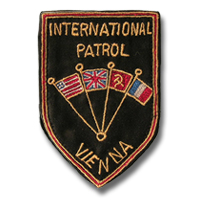 International Patrol Vienna Patch (British?) International Patrol Vienna Patch (British?) |
| |
| (Source: "796th Military Police Bn, 1947-1948 Yearbook") |
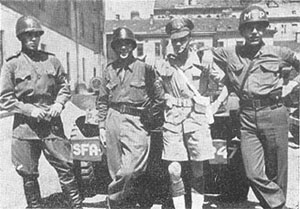 Cpl Robert C. Perryman (on far right), of Co "C", and the Russian, French, and British members of his International Patrol
Cpl Robert C. Perryman (on far right), of Co "C", and the Russian, French, and British members of his International Patrol
|
|
The International Patrol, consisting of a Russian, a French, a British, and an American Military Policeman from the 796th, is perhaps one of the most outstanding examples of practical cooperation among nations. The International Patrol, although theoretically an instrument of the Four Powers and subject to orders from the combined forces, is in reality an American operated and supplied organization. All vehicles, gas and oil for the vehicles, radios, radio parts, maintenance of the vehicles and radios, operation of the Radio Network System, and smooth operation of the patrols are the responsibility of the 796th Military Police Battalion. The American member of the patrol drives the vehicle, operates the radio, and performs the first echelon maintenance required on the equipment.
|
|
|
At the meeting between the Russian, British, and American Provost Marshals on 4 August 1945, it was agreed that a series of patrols would commence on 5 August 1945 at 1000 hours. The French did not become active on the patrols until 27 September 1945. The first patrols operated from 1000 hours to 2400 hours on Sundays and from 1800 to 2400 hours on weekdays. The value of the patrols in handling minor misunderstandings between the four powers was soon recognized, and on 1 November 1946 the patrols were operating "around-the-clock."
Initially, jeeps were used as International Patrol vehicles. However, through experience gained in operation, it was soon learned that a jeep equipped with a short wave transmitter-receiver was too small to accomodate a patrol of four men, not to mention the necessity of taking into custody additional persons. During October 1946 a remedy was found by replacing the jeeps with a ¾-ton Command and Reconnaissance vehicle.
The uniform of the International Policeman is the same as the uniform of his nation, with the exception of the International Patrol arm band worn by all members of the patrol, which consists of the Russian, French, British, and American flags on a black background, below which is printed "International Patrol" in English, French, and Russian. The American, French, and Russian member of the patrol wear the insignia on the left sleeve. The British member wears his insignia on the right sleeve.
The inspections of the patrols by an Officer of one nationality is not completely without incident due to the language barriers and differences in drill of the various armies involved. As an example, during the inspection in front of the Auersberg Palais on 19 March 1947, at the command "Take your posts," part of the group saluted, some executed "right face," and others did both. Also during the inspection, one of the patrol members showed the Inspecting Officer a fully-loaded pistol, pointed the barrel at the member standing next to him, and when instructed to unload his pistol, pointed it in the face of the Inspecting Officer. The Inspecting Officer's face became pale. The difficulties of language and procedure have long since been ironed-out, and the International Patrol inspections are performed with snap and precision at 1245 hours daily.
Between 1300 and 1900 hours daily there are five International Patrols operating, one each in the American, French, British, and Russian sectors, and also a "Standby" at the Hq. of the International Patrol. Between 1900 and 0100 hours, the number of patrols is the same as between 1300 and 1900 hours. Between 0100 and 0700 hours there are only three patrols operating; one for the American and French sectors, one for the British and Russian sectors, and a "Standby." The patrols are constantly on the alert for traffic violations involving allied vehicles, and incidents involving personnel of any two different powers. Patrol members on the 1300 - 1900 shift eat evening meal in the mess of the 796th MP Bn.
The following is an account of one of their experiences while on duty with the International Patrol by two International Patrolmen. Cpl Robert C. Perryman, of Clinton, Iowa, and an International Patrolman since January 1947, relates the following incident:
"I was patroling a street in the 10th Bezirk (Russian Zone), when suddenly the Russian member of the patrol noticed a vehicle ahead of us and told me to force the truck to the curb. Twice I tried to force the vehicle to stop, but both times the driver ignored the warnings and proceeded. Finally, the Russian member sitting next to me drew his pistol and fired at the truck, which continued on its course. After using his supply of ammunition, the Russian member borrowed the French member's pistol. Only after the Frenchman's ammunition had been exhausted did the truck halt. The driver was taken into custody and the vehicle was driven to the Russian Kommandatura. The remarkable fact about this incident was that although both pistols were fired, neither the driver, nor the vehicle were seriously harmed."
Cpl Edwin L. Luck, of Amsterdam, New York, and an International Patrolman since July 1947, relates the following incident:
"I received a message to proceed to the Astoria Hotel, a British hotel in the 1st Bezirk. When the other members of the patrol and I arrived, we learned that somebody had been dropping empty wine bottles from a window of the hotel onto the sidewalk on Kärntnerstrasse, endangering the pedestrians. It was around midnight and extremely dark. At intervals, bottles continued to fall from an upper-story window, but it was difficult to determine which window they were coming from. The British member of the patrol asked the assistance of the members, and a search of all the rooms was begun. After approximately an hour, two intoxicated men were found in a room on the top floor. When they were questioned, it was learned that they had been drinking, and after finishing a bottle disposed of it by the easiest means: tossing it out of the window. The remarkable fact about this incident is not the amount of wine drunk by the men, but how none of the people passing below the window had been injured."
1st Lieutenant Keith M. Ownby, of Company "C", is the International Patrol Officer, in charge of all Amercian members of the International Patrol. |
|
 |
|
| |
| Motorcycle Squad |
| |
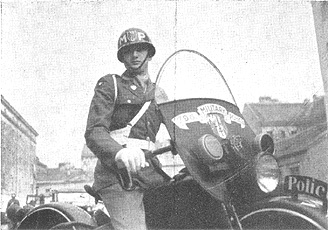
1st Bezirk Station |
|
| |
| (Source: "796th Military Police Bn, 1947-1948 Yearbook", courtesy Mike Keefe) |
The Motorcycle Squad, under the supervision of Sgt Conrad C. Bower, consists of 20 men from Company "B" who patrol the streets of the American zones on the alert for traffic, or uniform violations.
They use Harley-Davidson air-cooled motorcycles on their patrols, which take place from 1000 hours to 1700 hours daily.
Motorcycle Squad personnel also serve as escorts for visiting dignitaries, and also perform the necessary repairs on their individual vehicles. |
 |
|
| |
| Radio Patrol |
| |
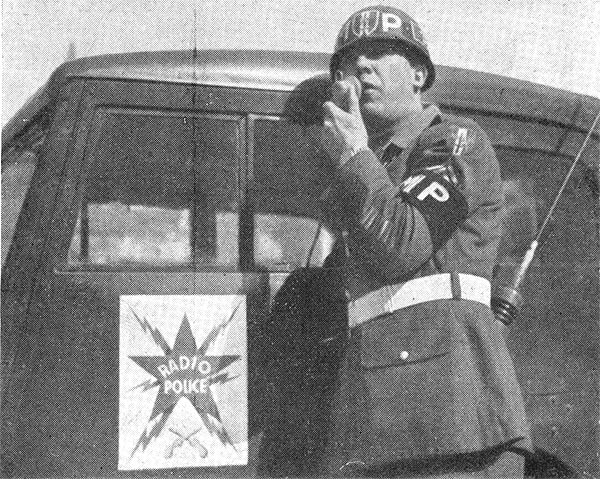
T/Sgt Roland G. Inman, on Radio Patrol duty, is shown reporting to the NCS Operator by radio |
|
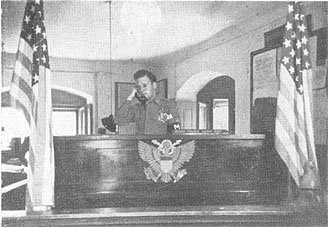
T/5 William E. Shurling, Radio Desk Sgt, of Company "C", is shown answering the telephone in the Radio Room of the Vienna Provost Marshal's Office
|
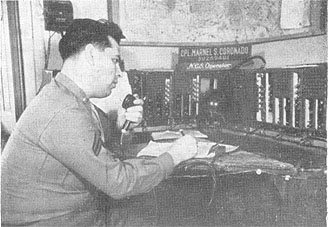
Cpl Manuel S. Coronado, an NCS Operator, of Company "C" , is shown as he calls one of the patrols by radio |
|
|
|
 |
|
| |
| Vice Squad |
| |
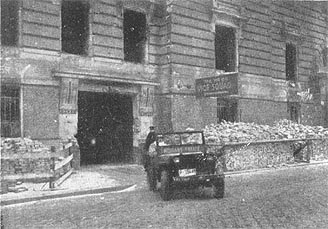
Vice Squad Headquarters |
|
| |
| (Source: "796th Military Police Bn, 1947-1948 Yearbook", courtesy Mike Keefe) |
There are one officer and ten enlisted men assigned to the Vice Squad for duty. 2nd Lt Henry Korotsky is Vice Officer. T/Sgt Bill A. Canga is the Vice NCO, and directly in charge of the enlisted men working in the section. There are three Desk Sergeants: Sgt Abbott, T/4 Fisher, and Pfc Stubbs. Assisting them are three Desk Corporals: Pfc Paturzo, Pfc Briggs, and Cpl Oliver. There are also three Drivers: T/5 Massie, Pfc Hannah, and Cpl Goodman. In addition to the above military personnel, there are four Austrian interpreters, two Austrian Criminal policemen from the Austrian Anti-Vice Squad, and one policeman from the regular Austrian police force.
The Vice Squad was established in November 1946 for the purpose of combating the spread of Venereal Disease in Vienna. Since its origin, the Vice Squad has apprehended 1077 women, who were found to be infected, and were prohibited from entering American installations. There are 366 registered prostitutes in the city of Vienna, and individual dossiers of approximately 4500 women are on file at the Vice Squad headquarters.
Female vagrants, or delinquents, upon being apprehended, are brought to Vice Squad headquarters, where all pertinent personal data on the individual is filed. They are then taken to the Austrian Criminal Police office, where more information is obtained, and afterward examined by Austrian Public Health officials. A copy of the medical report is later sent to the Vice Squad.
Only Austrian women found in disreputable places with American personnel, or women found loitering near American installations without proper identification, are arrested by the Criminal Police. Vice Squad personnel never enter into the incident. They serve only as drivers for the civilian police, and protect American military and civilian personnel from the danger of uncontrolled prostitution in Vienna. |
 |
|
| |
| Detention Point |
| |
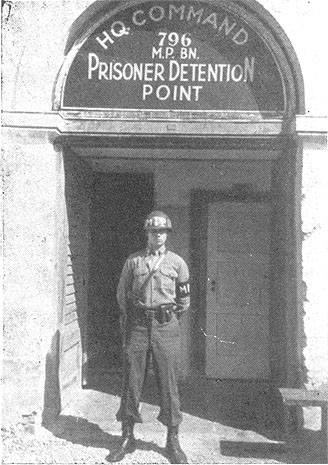
796th MP Bn's Prisoner Detention Point |
|
| |
| (Source: "796th Military Police Bn, 1947-1948 Yearbook", courtesy Mike Keefe) |
Four enlisted men and one officer comprise the total personnel who supervise the administration of the 796th Military Police's Prisoner Detention Point. The Police and Prison Officer is Captain Edwin F. Gracie, also the Bn. Motor Officer. The Provost Sergeant is 1st Sgt Andrew Hill, and his assistant is T/Sgt Franklin E. Sullivan. There are only two clerks: T/5 Bert M. Louisell, Administrative Clerk; and Pfc Richard Hamel, Supply Clerk.
Inmates of the Detention Point are classified in four categories: prisoners awaiting trial by courts-martial; prisoners awaiting investigation of charges preferred against them; prisoners detained for violations; and garrison prisoners serving their sentences. All General prisoners are sent to Salzburg for confinement.
When a prisoner enters the Detention Point, all articles of outer clothing, personal belongings, and valuables are securely stored until such time as he is released, or his sentenced is completed. Personnel of the 796th MP Bn serve as guards and jailers 24 hours a day. Personnel working in the Detention Point are responsible for the confinement of the prisoners, and must be constantly on the alert for a possible escape attempt by any of the inmates. "Prisoner Chasers," as the guards are called, undergo a monotonous and tiresome routine, and must display the best qualities to be found in a Military Policeman. |
 |
|
| |
Related Links:
|
| |
| |
|
 796th Military Police Bn DI
796th Military Police Bn DI  International Patrol Vienna Patch (British?)
International Patrol Vienna Patch (British?) 